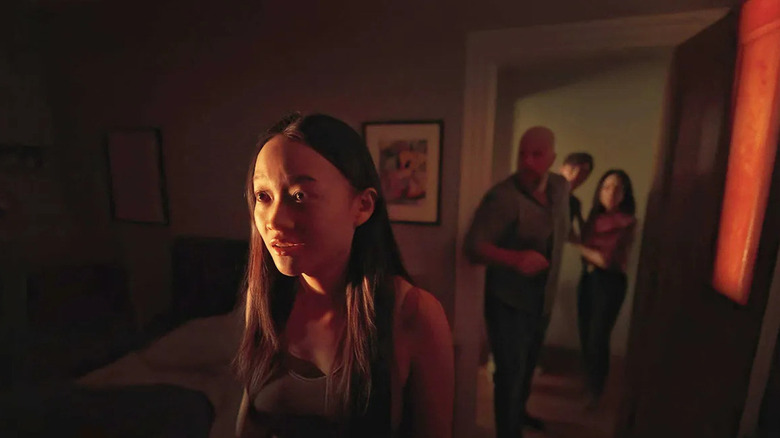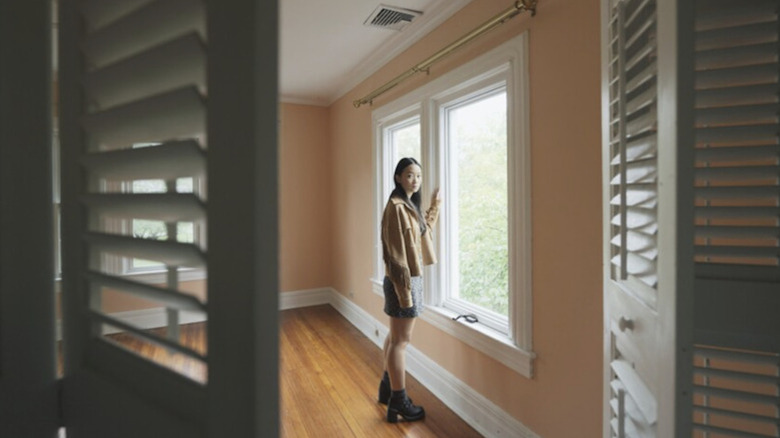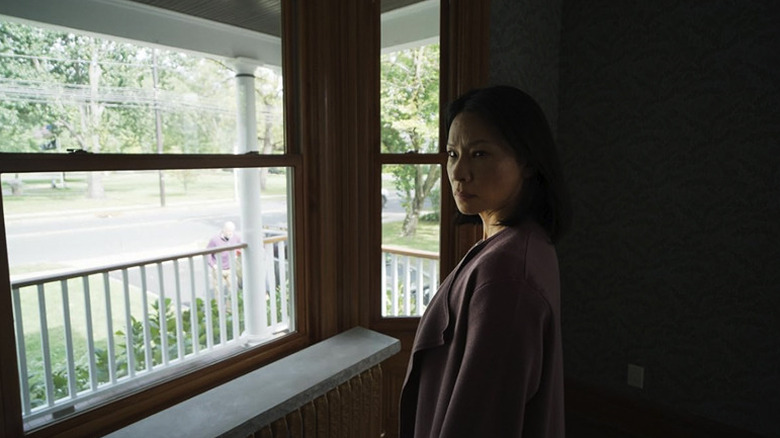How Scary Is Steven Soderbergh's Horror Movie Presence? The R Rating Explained
In this age of streaming entertainment, viewers' criteria for what qualifies as a multiplex-worthy movie has changed dramatically. Generally, a film has to be a four-quadrant tentpole or a family-friendly animated piffle (preferably with a toy or video game tie-in) to get people out of their houses. Comedies are no longer a safe play, nor are adult-skewing dramas. Small-scale films in general are typically viewed on the couch as a second-screen distraction. Horror movies, however, are typically an exception.
Whether they're big studio productions like "Nosferatu," "A Quiet Place: Day One," and "Alien: Romulus," or more modestly scaled indie efforts like "Longlegs," "Terrifier 3," and "Talk to Me," moviegoers (mostly of the younger variety) will show up on opening weekend provided the hook is well-baited. They don't need stars, and they certainly don't need ecstatic early word from critics (lamentably); all they desire are a few good scares, some creepy atmosphere, and, if it's a slasher flick, a smattering of gnarly kills.
Prestige is rarely a consideration when it comes to mainstream moviegoers' interest in the genre, so the fact that the highly esteemed, Academy Award-winning director Steven Soderbergh has made his first official horror film in "Presence" probably won't move the needle much for teens and twentysomethings (most of whom weren't even born when he won Best Director for "Traffic" in 2001). They will, however, perk up when they hear the hook: It's a haunted house movie shot from the perspective of the ghost — i.e. the ghost is the camera. It's a dynamite concept that fires one's visual imagination, which is something that can't be said about many movies throughout film history.
What does that look like? How does this conceit work within the confines of a conventionally structured narrative? Most importantly, if the audience is essentially the ghost, how do you generate scares?
The answer to that last question is, quite simply, you don't. And that's what makes "Presence" such an exhilaratingly singular experience.
Presence is a ghost story after something more than scares
"Presence" reteams Soderbergh with screenwriter David Koepp, who penned his nifty 2022 thriller "Kimi." Koepp is best known as the A-list scribe of blockbusters like "Jurassic Park" and the upcoming "Jurassic World: Rebirth," "Mission: Impossible," and "Spider-Man," but he's an intriguing choice for "Presence" given that he wrote and directed a terrific adaptation of Richard Matheson's paranormal horror novel "Stir of Echoes" in 1999. Now, that film, in which a regular working-class joe (Kevin Bacon) finds himself in touch with the spirit realm after getting hypnotized, was scary; indeed, it's probably responsible for gearing some cinephiles up for something truly frightening in "Presence."
Koepp's plot centers on a family of four who are eager to move into a new house following a vaguely referenced tragedy that claimed the life of their daughter's best friend. The mother, Rebekah (Lucy Liu), runs the show, and prizes the house less for its considerable two-story charms than its proximity to a high school with a first-rate swim team on which her son, Tyler (Eddy Maday), will likely thrive. She cares less about the well-being of her daughter Chloe (Callina Liang), who's awash in grief, so it falls to her accommodating husband Chris (Chris Sullivan) to hold the entire family unit together — which is complicated by his exploration of a divorce in light of Rebekah's involvement in a shady financial deal.
All of this is gleaned from the perspective of an unknown entity that floats all over the house, and seems particularly interested in Chloe. Soderbergh cleverly puts the audience on the ghost's emotional wavelength by having it express, through its movements, feelings of curiosity, anger, and fear. Its safe space is Chloe's closet, from which it observes her blossoming relationship with Tyler's swim team buddy Ryan (West Mulholland). Ryan comes on like an ideal boyfriend; he respects Chloe's boundaries and asks for her consent as they tiptoe their way to sexual intimacy. But we can feel from the ghost's energy that it's skeptical of, if not hostile to, Ryan.
If this sounds more unnerving than terrifying, that's by Soderbergh's design. "Presence" isn't out to scare you. Narratively, it's a mystery that unfolds in a conventionally structured manner. What keeps it from feeling gimmicky is the ghost's acute interest in the family, which draws us into this haunted space they inhabit. It's this quality that makes "Presence" a vital work of art from a master filmmaker.
Presence is an unusual R-rated horror film
There is one legitimate scare in "Presence," and it arrives at a perfectly timed moment. There's also a good deal of suspense built during a visit by a spiritual medium (Natalie Woolams-Torres), a scene that calls to mind any number of haunted house movies (while injecting a bit of levity into the proceedings as well). But "Presence" is more "Ordinary People" than "Poltergeist." It's about a family that's tearing itself apart and leaving itself vulnerable to an evil, all-too-human force. There's almost no violence and certainly no gore, so what's with the R-rating?
Like any drama about domestic turmoil, there are more than a few F-bombs hurled throughout the film's tight-as-a-drum 85-minute runtime. And we do see Chloe having sex with Ryan from the ghost's point of view in the closet. Overall, though, "Presence" is a deeply sad movie. The only demons that need to be exorcised are those that have burrowed deep into the souls of each family member. If moviegoers leave themselves open to the film's sharp attention to character detail and, of course, its formal, subjective-camera audacity, they'll find "Presence" a gripping experience, the kind that's best shared in a darkened theater with strangers who harbor their own ghosts, because we are all haunted.


